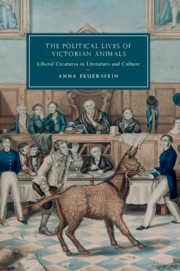Book contents
- The Political Lives of Victorian Animals
- Cambridge Studies in Nineteenth-Century Literature and Culture
- The Political Lives of Victorian Animals
- Copyright page
- Dedication
- Epigraph
- Contents
- Figures
- Acknowledgments
- Introduction
- Part I Anti-Cruelty Legislation and Animal Welfare
- Part II Democracy, Education, and Alternative Subjectivity
- Part III The Biopolitics of Animal Capital
- Chapter 5 Animal Capital and the Lives of Sheep
- Chapter 6 The Political Lives of Animals in Victorian Empire
- Coda
- Works Cited
- Index
- Cambridge Studies in Nineteenth-Century Literature and Culture
Chapter 6 - The Political Lives of Animals in Victorian Empire
Olive Schreiner’s Anti-Colonial Animal Politics
from Part III - The Biopolitics of Animal Capital
Published online by Cambridge University Press: 08 June 2019
- The Political Lives of Victorian Animals
- Cambridge Studies in Nineteenth-Century Literature and Culture
- The Political Lives of Victorian Animals
- Copyright page
- Dedication
- Epigraph
- Contents
- Figures
- Acknowledgments
- Introduction
- Part I Anti-Cruelty Legislation and Animal Welfare
- Part II Democracy, Education, and Alternative Subjectivity
- Part III The Biopolitics of Animal Capital
- Chapter 5 Animal Capital and the Lives of Sheep
- Chapter 6 The Political Lives of Animals in Victorian Empire
- Coda
- Works Cited
- Index
- Cambridge Studies in Nineteenth-Century Literature and Culture
Summary
In this chapter I examine how indigenous South African animals, especially those used for capital, reinforced or rejected liberal imperial ideologies. I focus on the ostrich, native to South Africa and first domesticated by British colonists in the 1860s, and argue that even though ostriches were seen as ungovernable, colonists fostered their lives; as such both animal minds and bodies were controlled by British liberal imperialism. I then show how Oliver Schreiner’s essays, letters, and best-selling novel The Story of an African Farm conceptualize animals outside liberal imperial discourses and suggest that animality – in the form of animal–animal relationships and animal epistemology – offers alternate political models for human relationships within the space of empire especially. Through her portrayal of the ostrich, meerkats, and birds, Schreiner offers an animal politics that invites readers to rethink negative conceptions of animality and, by extension, liberal imperial discourses that operate within a speciesist logic.
Keywords
- Type
- Chapter
- Information
- The Political Lives of Victorian AnimalsLiberal Creatures in Literature and Culture, pp. 198 - 226Publisher: Cambridge University PressPrint publication year: 2019

